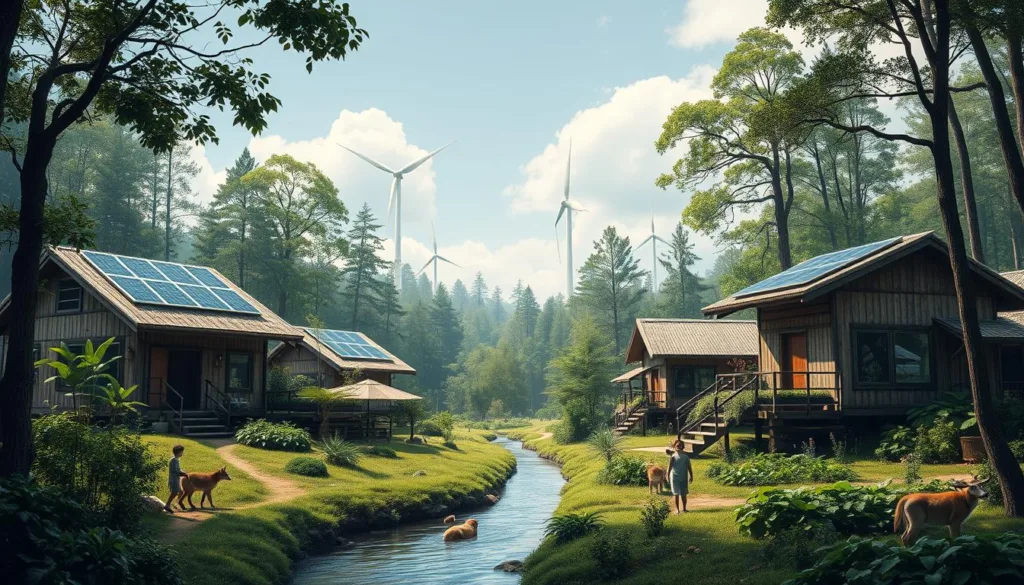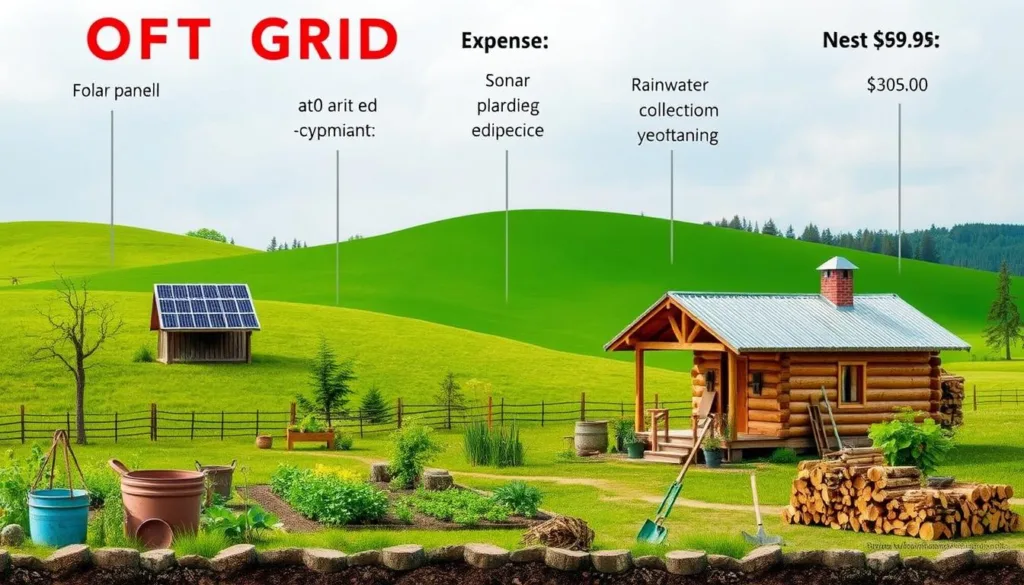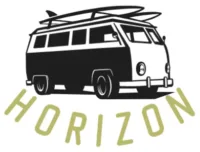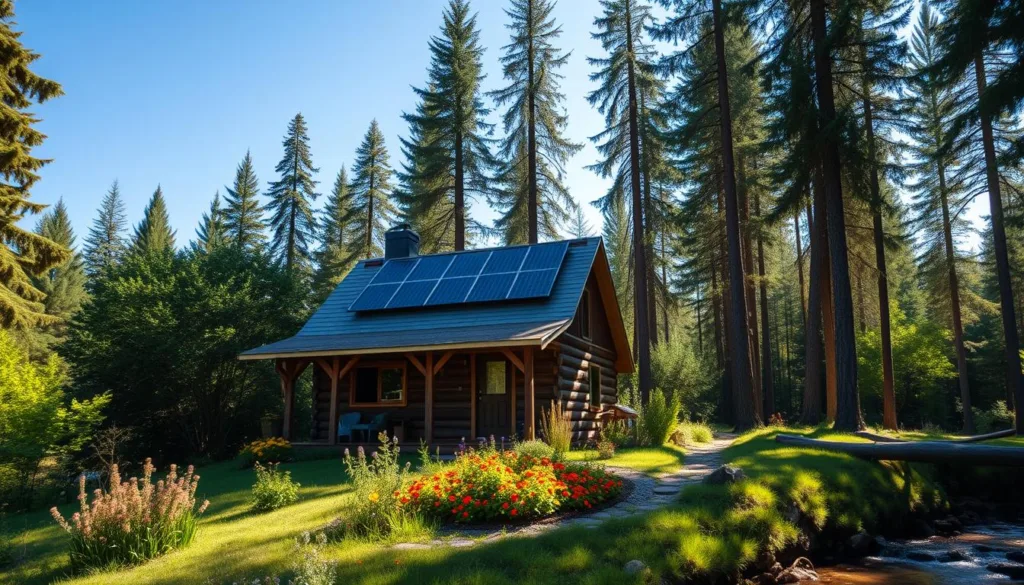As I gaze out over my off-grid property, a profound sense of peace washes over me. The solar panels quietly hum, and my garden thrives with life. Embracing this journey of living off-grid has been challenging but incredibly fulfilling, and I’m excited to share the lessons I’ve learned along the way.
Living off-grid is more than escaping the daily grind. It’s about reconnecting with nature, gaining independence, and shaping our world.
Living Off-Grid : Key Takeaways
- Discover the freedom and benefits of living off-grid, where self-sufficiency and sustainable living take center stage.
- Explore the keys to thriving in an off-grid lifestyle, from harnessing alternative energy to creating your own off-grid paradise.
- Learn how to incorporate more self-reliant practices into your life, whether you’re considering a full transition or simply seeking a greener lifestyle.
- Gain insights and resources to live an empowered, eco-friendly life and embrace the joy of self-sufficiency.
- Understand the challenges and rewards of off-grid living, from building an off-grid community to managing water and waste.
What is Living Off-Grid?
Living off-grid means being self-sufficient and not relying on traditional utilities. People use renewable energy, grow their own food, and live simply. They might choose this lifestyle for many reasons, like caring for the environment, wanting financial freedom, or seeking a more independent life.
Understanding Living Off-Grid Lifestyle
The off-grid lifestyle uses alternative energy like solar panels and wind turbines. It also includes rainwater harvesting and composting toilets for managing water and waste. This way, off-gridders can live without depending on public utilities.
Reasons for Going Off-Grid
- Reducing environmental impact and carbon footprint
- Achieving financial independence and lowering living expenses
- Escaping the constraints of traditional utility-based living
- Seeking a more self-reliant and autonomous way of life in a rural lifestyle
- Embracing a minimalist approach to daily living
Choosing to live off-grid is about wanting a sustainable, self-sufficient life. It’s about reducing environmental harm, gaining financial freedom, and connecting more with nature. By living off-grid, people can live more independently and simply.
Sustainable Living
Starting your off-grid journey means adopting sustainable living. It’s about lowering your environmental impact and living in harmony with nature.
Renewable Energy Sources
Renewable energy is key to sustainable living. Many use solar panels to capture the sun’s energy. This powers their homes and gadgets. Others might use wind turbines or small hydroelectric systems, based on their location.
Reducing Your Carbon Footprint
Off-grid living also means cutting down your carbon footprint. This includes reducing waste, recycling, and using electric vehicles or bikes. By being mindful and conservative, off-gridders help the planet and future.
“Sustainable living is not just a choice, it’s a responsibility we all share to protect our planet and its fragile ecosystems.”
Living off-grid means using the sun, wind, or water for energy. It also means cutting down waste and carbon emissions. By doing this, you live a more fulfilling life and help protect our environment.
Minimalist Living
Living off-grid often means embracing a minimalist lifestyle. Off-grid fans value simplicity, functionality, and using resources wisely. This way of living reduces environmental harm, cuts down on costs, and helps appreciate the basics.
Minimalist living is about having fewer things and focusing on what’s truly needed. Off-gridders aim for a life that values mindfulness, self-reliance, and a strong bond with nature. By owning less, they have more time and energy for important activities.
Embracing off-grid minimalism also means a smaller environmental footprint. With fewer things, the need for energy, water, and other resources drops. This makes it easier for off-gridders to use green energy and sustainable methods, reducing their impact on Earth.
“The simplest things are often the truest.”
– Richard Bach
A minimalist off-grid lifestyle also brings more freedom and self-sufficiency. Without too much stuff, off-gridders can learn new skills, grow their own food, and connect more with the land and people around them.
Living Off-Grid
Essential Skills for Self-Sufficiency
To live off-grid, you need to learn many skills. These include managing renewable energy, handling water and waste, and growing your own food. These skills make you more independent and able to handle challenges without relying on others.
Growing Your Own Food
Off-gridders often grow their own food. They raise animals and preserve food to have a steady supply. This way, they control what they eat and reduce their carbon footprint.
To grow your own food, you need to know how to:
- Vegetable gardening
- Fruit tree and berry cultivation
- Raising chickens, goats, or other livestock
- Food preservation techniques like canning, dehydrating, and fermentation
These skills help you have a steady and healthy food supply. They make you less dependent on others and more self-sufficient.
“The true harvests of my daily life are modest, yet I have never felt the need to manufacture anything to be planted.” – Henry David Thoreau
By learning these skills and growing your own food, you can live a more sustainable life. You’ll reduce your environmental impact and feel more in control of your life.
Alternative Housing Options
Off-grid living often means choosing unique homes like tiny homes, off-grid cabins, or even life in a van or RV. These options let you move around easily, use fewer resources, and be more independent. cabins and Tiny homes let you create your own off-grid living space.
Tiny Homes and Cabins
Tiny homes and off-grid cabins are becoming more popular for a sustainable lifestyle. They use less energy and resources, with features like solar panels and rainwater harvesting. Living in a smaller space helps you focus on what’s important and reduce your environmental impact.
Life in a Van
Vanlife is about living in a converted van or RV for freedom and mobility. These mobile homes make it easy to travel and explore new places. Living in a van requires planning, but it’s a rewarding way to live off-grid.
“The freedom of living in a van is unparalleled. It’s a constant adventure, and I wouldn’t trade it for anything.” – Emily, a van-dwelling off-gridder
Choosing a tiny home, off-grid cabin, or vanlife lets you create a lifestyle that fits your values. It’s about living sustainably and being self-sufficient.
Building an Off-Grid Community
Many people and families are drawn to off-grid living. They find joy in intentional communities. These places are filled with those who love self-sufficiency and sustainable living.
Off-grid communities are great for sharing resources and knowledge. Together, they can overcome challenges. This includes building renewable energy systems and growing gardens.
These communities are all about belonging and helping each other. People learn from each other and solve problems together. This helps prevent feelings of loneliness in remote areas.
- Shared resources and knowledge
- Collaborative problem-solving
- Strong sense of community and belonging
- Mutual support and skill-sharing
| Benefits of Off-Grid Communities | Challenges of Off-Grid Communities |
|---|---|
| Pooled resources and knowledge Collaborative problem-solving Strong sense of community Mutual support and skill-sharing | Navigating group dynamics Aligning individual and collective goals Maintaining financial sustainability Balancing privacy and community |
Off-grid communities have many benefits but also face challenges. Issues like group dynamics and financial sustainability need careful thought. Finding a balance between privacy and community is also important.
“The beauty of an off-grid community is that we’re all in this together, supporting each other and learning from one another’s experiences. It’s a true testament to the power of collaboration and shared purpose.”
Despite the hurdles, the sense of community in off-grid living is a big draw. It encourages people to work together towards a sustainable lifestyle. This way, off-gridders can build strong, thriving communities that inspire others.

Off-Grid Water and Waste Management
Sustainable living is key in the off-grid lifestyle. Managing water and waste is crucial. Off-gridders often use rainwater harvesting systems to collect and store water for home use. This reduces their need for traditional water sources.
Rainwater Harvesting
Rainwater harvesting captures and stores rainwater for later use. Off-grid homeowners might install systems to collect rainwater from roofs. This water can be used for bathing, cleaning, and even drinking, after it’s filtered and purified.
This method not only saves local water resources but also makes off-gridders more self-sufficient.
Composting Toilets and Graywater Systems
Off-grid living also includes unique waste management solutions. Composting toilets turn human waste into compost for gardens and crops. Graywater systems, meanwhile, recycle wastewater from sinks, showers, and washing machines for irrigation or other uses.
These systems reduce environmental impact and promote a closed-loop system of resource management.
| Off-Grid Water Management Solution | Benefits |
|---|---|
| Rainwater Harvesting | Reduced reliance on traditional water sources Self-sufficiency in water supply Environmentally friendly approach |
| Composting Toilets | Conversion of waste into nutrient-rich compost Reduced water usage compared to traditional toilets Promotion of a closed-loop waste management system |
| Graywater Systems | Recycling of household wastewater for irrigation or other non-potable uses Reduced strain on freshwater resources Promotion of a circular water management approach |
By using these innovative solutions, off-gridders can lessen their environmental footprint. They also reduce their need for traditional utilities. This leads to a more sustainable lifestyle.
Financial Aspects of Off-Grid Living
Living off-grid can save a lot of money. Off-gridders often spend less than those living in traditional homes. They save on utility bills, mortgage payments, and other costs.
Reducing Living Expenses
Off-grid living helps cut down on expenses. Using solar panels or wind turbines for power is a big money-saver. Plus, tiny homes or cabins are cheaper to build and maintain than big houses.
Income Sources for Off-Gridders
Off-gridders find ways to make money too. Many work from home, using their tech skills. Others start small businesses, like selling food they grow or making crafts.
Embracing off-grid living can lead to financial freedom. It makes people more self-sufficient and secure, living in line with off-grid values.

“The financial freedom that comes with living off-grid is truly liberating. It allows me to focus on what’s truly important and live a more sustainable, fulfilling life.”
Challenges of Living Off-Grid
The off-grid lifestyle has many benefits, but it also comes with challenges. Accessing reliable and affordable healthcare is hard for those living far from cities. Also, navigating legal and regulatory frameworks for off-grid living can be complex and requires persistence.
Getting consistent internet and communication services is another challenge. Remote areas often have poor internet access. Living off-grid also means doing physical tasks like growing food and managing energy and water systems, which can be hard.
- Accessing reliable and affordable healthcare
- Navigating legal and regulatory frameworks
- Securing consistent internet and communication services
- Adapting to the physical demands of self-sufficient living
Beating these challenges needs resilience, problem-solving skills, and a willingness to adapt. With the right mindset and preparation, many have found rewarding ways to live off-grid.
“The off-grid lifestyle is not without its hurdles, but the rewards of self-sufficiency and connection to the natural world make it a worthwhile pursuit for those willing to embrace the challenges.”
Resources for Off-Grid Living
If you’re curious about off-grid living, there’s a lot to explore. You can find books, websites, and online communities that offer great advice and support. These resources help you learn and connect with others who share your interests.
Books and Websites
Start with some essential books on off-grid living. “The Self-Sufficient Life and How to Live It” by John Seymour and “Tiny House Living” by Ryan Mitchell are great choices. They cover topics like renewable energy and growing your own food.
For more information, check out websites like “Off Grid World” and “Homesteading Simple”. They have guides, stories, and expert tips to help you on your journey.
Off-Grid Communities and Events
- Join local and national events to meet others and learn from experts. The “Off-Grid Expo” and “Tiny House Jamboree” are great places to share knowledge and see the latest off-grid tech.
- Look for off-grid communities near you or across the country. They often have tours and educational programs. This is a chance to see off-grid living up close.
By using these resources, you can start your off-grid adventure with confidence. You’ll gain the skills and support you need to live a self-sufficient life.
“The key to off-grid living is self-reliance and a deep connection with the natural world.”
Conclusion
Living off-grid is a path to a more sustainable life. It makes you self-reliant and empowered. By choosing this lifestyle of living off-grid, you can lower your environmental impact. You also gain financial independence and connect more with nature.
The journey to off-grid living has its challenges. But the rewards of a more autonomous, eco-friendly life are great. Embracing self-sufficiency through off-grid living lets you control your resources. It reduces your need for traditional systems and brings a new sense of purpose.
As more people see the benefits of living off-grid, the movement grows. The off-grid community shares knowledge and experiences. This inspires others to live a more conscious, intentional, and fulfilling life.
FAQ
What is living off-grid?
Living off-grid means being self-sufficient and not relying on public utilities like electricity and water. It involves using renewable energy, growing your own food, and living simply.
Why do people choose to go off-grid?
People choose off-grid living for many reasons. They might want to save money, live more sustainably, or enjoy independence.
How do off-gridders embrace sustainable living?
Off-gridders use renewable energy like solar and wind power. They also try to reduce waste and use eco-friendly ways to travel.
What does a minimalist lifestyle look like in an off-grid setting?
In off-grid living, simplicity is key. People focus on using resources wisely and appreciate the basics more. This helps the environment and saves money.
What essential skills are required for self-sufficiency in an off-grid lifestyle?
To live off-grid well, you need skills in energy, water, and food. Growing your own food and managing waste are important. This ensures a steady supply of healthy food.
What are some alternative housing options for off-grid living?
Off-grid homes can be tiny houses, cabins, or even vans. These options are mobile, eco-friendly, and promote self-reliance.
How do off-gridders manage water and waste?
Off-gridders collect rainwater for drinking and use. They also have composting toilets and graywater systems to handle waste. This keeps their environment clean.
How can living off-grid be financially beneficial?
Off-grid living can save a lot of money. It cuts down on utility bills and mortgage costs. Off-gridders can also make money through work or small businesses.
What are some of the challenges of living off-grid?
Off-grid living has its challenges. Finding good healthcare and internet can be hard. It also requires physical effort and flexibility. But, with determination, these challenges can be overcome.
Where can I find resources for living off-grid?
There are many resources for off-grid living. Books, websites, and communities offer advice and support. Off-grid events and workshops are also great places to learn and meet others.

